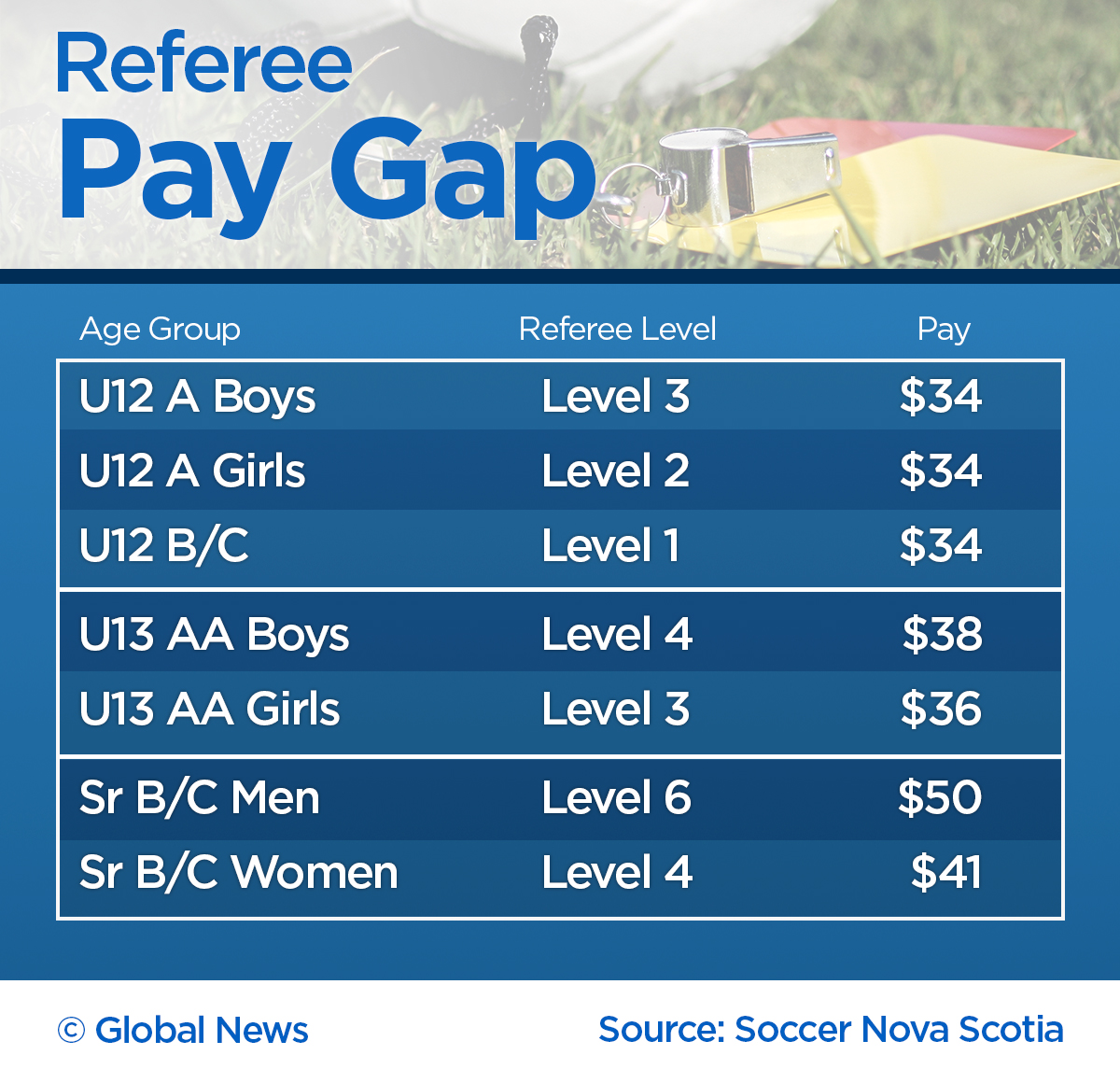If you’re a soccer referee in Nova Scotia, you likely know you’re paid more as you advance in your training. What you may not know is that you’re also paid more when you step on the pitch with male teams than with female teams at almost every level.

Soccer Nova Scotia’s referee development officer, Carman King, says that’s due to a number of factors.
“The fees are based on the level of the referee that’s needed for that particular game,” King said. “And so the men’s game, the boys’ game, usually is a bit faster and definitely has more management responsibilities by the referee.”
The pay scales are listed on a chart on the organization’s website. Global News has compiled that information along with the referee training requirements based on data provided by Soccer Nova Scotia. It appears a combination of the referee’s skill level and the level of game being played is used to determine pay.
For example, the pay is the same for boys and girls leagues in the Under-12 age group, even though the leagues require referees with three different levels of certification. In all cases, the referee’s pay is $34 per game.
- Life in the forest: How Stanley Park’s longest resident survived a changing landscape
- ‘Love at first sight’: Snow leopard at Toronto Zoo pregnant for 1st time
- Buzz kill? Gen Z less interested in coffee than older Canadians, survey shows
- Carbon rebate labelling in bank deposits fuelling confusion, minister says
As games move up in age and skill level, the pay changes. At the U13 AA level, boys’ games pay $38 for a Level 4 referee and girls’ games pay $36 for a Level 3. The largest pay gaps are in the older leagues. For a Senior B or C men’s game, a Level 6 referee is paid $50. A Level 4 referee officiating a Senior B or C women’s game is paid $41.
King says that in the past, the leagues “did have the same rates for male and female right through,” and it was the female leagues that “questioned whether that should be the case” since male and female games needed a different level of referee.
But a prominent voice in the province’s female soccer scene is questioning the current model.
Marisa Colzie, the head coach of Saint Mary’s University’s women’s soccer team, has been involved in coaching female soccer for 15 years.
“The game is exactly the same, that’s one of the reasons why I love soccer,” she said. “The size of the field stays the same, the weight and size of the ball stays the same for women and men, the size of the nets, the time we play… It is equal.
“For a governing body to kind of put a difference on reffing men and women, and a different value on it, that’s definitely disheartening.”
Nova Scotia stands alone in Canada
Global News has analyzed pay scales provided by other provincial soccer associations. In all cases, referees for male and female games at the same age and skill level receive the same pay. In Quebec, there are some pay differences at the senior levels, but none in minor soccer.
Shawn Harmon, a policy analyst with Dalhousie University’s Health Law Institute, calls that discrepancy strange.
“It’s very curious because a lot of these sport organizations, I think, speak to one another. There are provincial organizations that have national umbrella organizations,” he said.
Harmon, who recently published a paper on gender equity in sport, says Soccer Nova Scotia’s practice is discriminatory.
“Some of it won’t even be conscious, it’ll be systemic, it’ll be stuff that’s been inherited by people in current posts right now,” he said. “But there’s certainly a case to be made that it’s contrary to human rights notions of equality.”
Two of Colzie’s young players on the Huskies team this year are former referees.
Genelle Morash and Kailey Rankin were shocked to learn they were paid less for refereeing female games. Both say they were assigned male and female games during their years of refereeing, but they spent most of their time on the pitch with female teams.
“I just think that if I actually knew – I never knew that they paid different, so I wouldn’t have done that, for sure,” Rankin said.
“I think definitely in 2019 it should be known now, with everything that’s going on, that that’s not OK,” Morash said.
Women in the top levels of soccer have been demanding equality.
During the 2019 FIFA Women’s World Cup, the U.S. women’s national team’s fight with the U.S. Soccer Federation and FIFA over the gender pay gap made headlines. An Australian women’s team has just achieved pay equity for the first time.
Colzie has been around soccer long enough to have seen significant changes in the women’s game. She says there’s still a long way to go.
“Money equals value, unfortunately, in our society. And you know, we’re worth it. There should be no difference,” Colzie said.
According to the federal government, which recently launched a gender equity in sport research hub, only 34.9 per cent of coaches in Canadian sport are women. Only 30 per cent of officials are women.
Morash and Rankin say they left refereeing because of other commitments. But Morash says she thinks the pay inequity will hurt retention efforts.
“You’re sending that message to girls that they’re not going to get paid as much if they’re only reffing these games, so why would you want to stay?” she said.
Numbers provided by Soccer Nova Scotia show that the number of female referees in its system drops off at the higher levels of the game. Of the 94 referees at Level 0, 34 are female — 36 per cent. By Level 5, only six of the 40 referees — 15 per cent — are female. And of the 91 referees in the top five levels, only eight are women. That’s less than nine per cent.
In total, Soccer Nova Scotia’s figures show only 24 per cent of its officials are female.
Still, King doesn’t think there’s an issue with the way Soccer Nova Scotia is doing business.
“Knowing the demands of the game, no, it doesn’t raise a concern,” King said. “If you could look at the management and discipline issues within the leagues, you would understand where that difference is.”
Colzie isn’t buying that.
“There are all types of different athletes and all types of different coaches, and to stereotype and put different genders in boxes, I think that’s unfair,” she said.
“I know a lot of unruly female athletes and coaches.”
King does point out that Soccer Nova Scotia makes changes to its officiating pay scale every four years. Colzie hopes that leads to change.
“I think we have to get a hold of this because as a province we’re making strides in a lot of other ways within the soccer community,” she said. “Nationwide, there’s a lot of initiatives that we’re taking the forefront on.
“And to know that this is part of our soccer community, I just think it’s not right for the message that we’re trying to send to our female athletes, referees, coaches.”
-With files from Graeme Benjamin






Comments